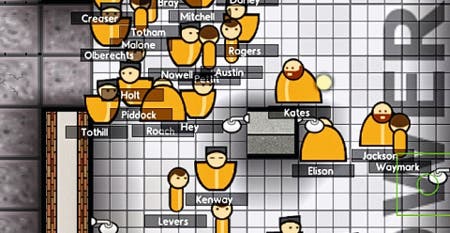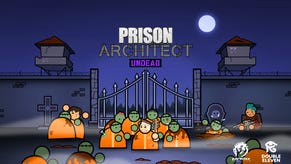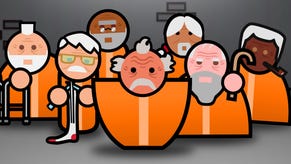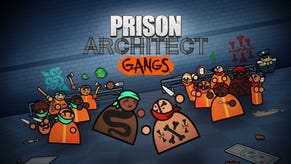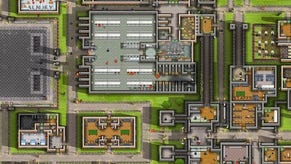Prison Architect Preview: The Key to Success
A management sim with an emotive twist.
Sound designer Alistair Lindsay stands onstage at the Bit of Alright conference in London, strange noises booming from the room's PA system. He's demonstrating the aural splendour of Introversion's new game, Prison Architect - a classic management sim with a smart twist.
At the rear of the hall, a group of us sit around a table of laptops, sampling the opening mission. We play to the soundtrack of Prison Architect's eerie ambiance married with Lindsay's in-depth commentary. For just a moment, the vibe is unsettling.
It's all about psychological trickery to get inside the minds of players says Lindsay, as he loads up the execution sequence we're simultaneously playing towards. Listen carefully, he says, and we'll notice that the sound of the electric chair powering up is, in fact, the same sound of a pistol cocking that we heard in a separate cut-scene minutes earlier. An unrealistic touch, perhaps, but it primes us for something awful to happen, and it all contributes to Prison Architect's dark, suspenseful mood.
It's the first Introversion game to possess quite this sort of atmosphere. Across its campaign, you take control of pre-constructed jails and build upon them, managing their components and working towards objectives, but that's not all it has to offer.
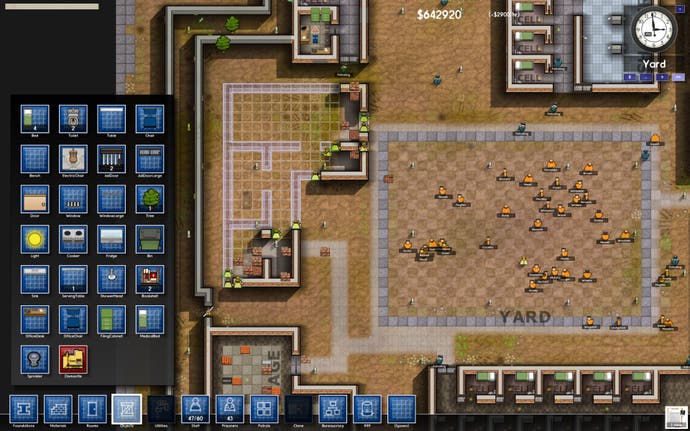
The idea of the game crystallized after Introversion brain-box Chris Delay visited Alcatraz. At the time, the company was still wrestling with procedurally generated infiltration game Subversion, but things weren't coming together smoothly. So, instead of redrafting its prison level, the team set about turning their ideas into an entirely new title.
Prison Architect is a game about managing limited resources - about balancing security with rehabilitation, and pitting punishment against productivity. However, quite uniquely for a management sim, it's also about storytelling and emotion. "I actually think management sims and stories go well together," says Delay, "and we really wanted to have some stories about interesting prisoners to bring people into the game. I mean, prisoners are fascinating characters, and prisons are such a rich area of story."
It's heavily stylised, which is a thing we've all come to expect from the indie developers who brought us Uplink, DEFCON and Darwinia. But this specific style feels fresh.
Gone are Introversion's trademark retro-future graphics, and gone is the sense of super-cool. In their place is something grimier, grittier, but potentially even more evocative.
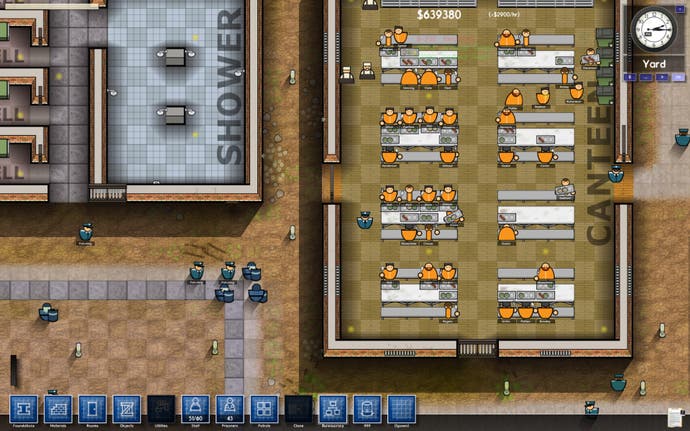
The aim is to make the player feel invested in a different way to previous Introversion titles. Constructing an execution chamber, and leading a troubled and regretful man towards his fate within it, left me with a pang of emotion that's so rare in our medium: guilt.
"The graphics are a lot less abstract than we would normally use," Delay explains. "But we knew the player had to feel some empathy for his prisoners, and we knew we wanted to tell some stories about real people." So, to work alongside Alistair Lindsay, Introversion enlisted the help of artist Ryan Sumo. His previous work on SpaceChem was striking, but less assuming. Here, it absolutely glows.
You view the game from a top-down perspective, and the interface is icon-drive - even the prisoners are represented by heads and torsos that float around the screen. But there's something elegantly rich about the visual style. Colourful and cartoonish in places, it's also stark and pristine yet oppressive and ominous. The in-game art is complemented by graphic novel-esque static cut-scenes that add a new level of depth to Prison Architect's image.
It's a busy look too, with inmates swarming around communal areas. As you build, the corridors and rooms of your prison spring into life, and observing them as they do so is enchanting.
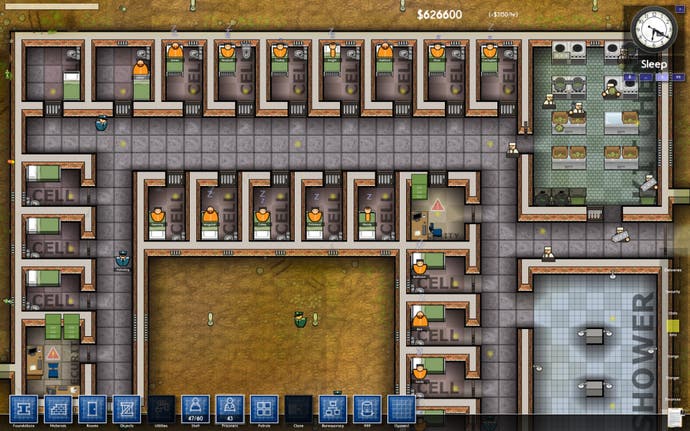
The result is a unique personality that flows from every inch of the presentation. But the focus on atmospheric storytelling doesn't mean construction and management take a back seat. With each new mission in the campaign, you'll be taught a new mechanic that allows more intricate control of your creations. Once you've pressed through to its closure, you'll be free to put your knowledge to work in an open-ended sandbox mode, which allows you to construct your prisons from scratch.
In many ways, then, the campaign is designed as an elaborately staged training session, one that draws you into the game world rather than simply teaching you how to play. "If we'd just thrown players in with the sandbox it would be very difficult to get your head around," explains Delay. "We knew we would have to help the player to understand the game, but we didn't want to produce a dreary tutorial."
Content from further into the campaign is being kept locked away for now, though we're promised increasing challenge and complexity as the missions tick on. Still, it seems we'll be able to get a much better idea of what to expect later this year: Introversion plan to run a paid public alpha, in much the same way as indie gems Minecraft and Frozen Synapse have already employed to massive success.
Creating a buzz is certainly something that's on Introversion's minds, but it's not the only reason to release early. "We're impatient!" says Delay. "We want people playing the game, but we're still a long way from finishing it. We really want to get all that early feedback before it's too late to change anything - that's a fairly major driver for us."
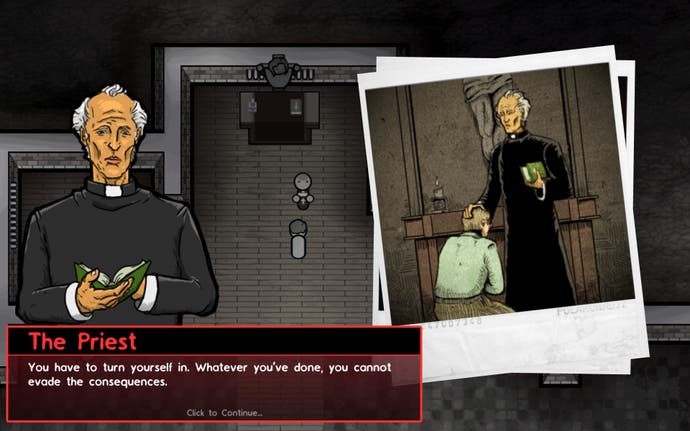
Delay admits that Introversion has struggled with quality assurance in the past - they're a small team, and their budgets are too low to employ full-time testers. "So we're hoping to get the game out earlier than we would normally, to get it exposed to a lot of gamers and get feedback before we are committed to version 1."
That final version is too far away yet to predict a release date - although Delay says it's unlikely to be any time before 2013. What's here is already supremely polished, though - the opening mission could have been pulled straight from a finished game.
The quality bar is impressive, but even more enticing is Prison Architect's clever twisting of management genre tropes. We're used to playing Roller-Coaster Tycoon and keeping our guests happy to drum up business, or building a metropolis in Sim City that residents won't want to leave. Contracting to a prison turns the idea on its head: now, its themes cover ethics and human rights, not just population appeasement. The name 'Subversion' would almost still suit.
Back at Bit of Alright, Alistair Lindsay demonstrates how the prisoners' human emoting contrasts with the guards' monstrous grunts, in a messy fight sequence that's as tense as it is chaotic. You're in charge of running a prison, yet you're asked to form bonds not with the upstanding citizens you employ, but with the offenders you're incarcerating.
"Introversion has always made dark and moody games, designed to make the player think," says Delay. But Prison Architect seems to go a step further: it's also designed to make you feel.
